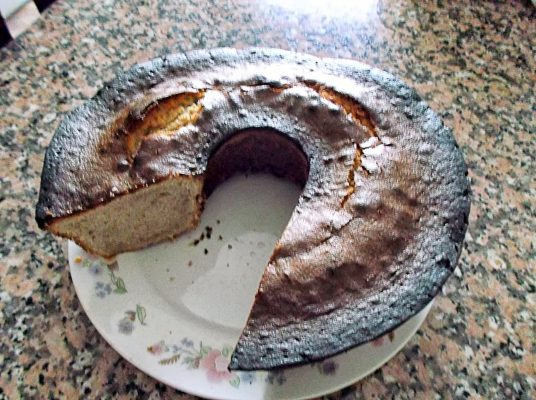Um bolo com alma rústica e sabor profundamente português. O azeite, ingrediente central desta receita, confere-lhe uma humidade incomparável e um aroma frutado que é realçado pela raspa de limão e pelas especiarias quentes, a canela e a erva-doce. Este é um bolo denso e fofo que, curiosamente, não leva fermento, encontrando a sua leveza nos ovos bem batidos. Perfeito para partilhar em qualquer ocasião, é um verdadeiro clássico da doçaria tradicional.
Ingredientes (8 Pessoas)
- 8 ovos
- 450 gr de açúcar
- 2,5 dl de azeite
- 1 colher de chá de canela em pó
- 1 colher de chá de erva-doce
- raspa de 1 limão
- 250 gr de farinha
- azeite para untar
- farinha para polvilhar
Preparação
- Barre uma forma com azeite e polvilhe-a com farinha.
- Ligue o forno a 180º C.
- Deite as gemas para uma tigela, junte o açúcar e bata até ficar um creme esbranquiçado.
- Adicione o azeite, bata mais 5 minutos, junte a canela, a erva-doce e a raspa do limão e bata.
- Adicione depois a farinha e misture.
- Por último, junte as claras batidas em castelo e envolva delicadamente.
- Deite a mistura anterior para a forma e leve ao forno durante 45 minutos.
- Verifique a cozedura com um palito, retire, deixe arrefecer um pouco, desenforme, deixe arrefecer totalmente e sirva o bolo decorado a gosto.
- Pode polvilhar com açúcar em pó e juntar fios de ovos.
Nota: A massa deste bolo é bastante fofa e não necessita de fermento.
From our Portuguese kitchen to yours, here’s a taste of tradition.
Olive Oil Cake
In the heart of Mediterranean baking lies a simple, golden secret: olive oil. This Portuguese Olive Oil Cake is a beautiful example of how this liquid gold can create a cake that is exceptionally moist, rich, and full of character. Unlike cakes made with butter, those made with a good quality olive oil have a uniquely tender crumb and a complex, fruity flavour that is both rustic and sophisticated. It’s a dessert that speaks of tradition and the sun-soaked groves of Portugal.
This recipe is reminiscent of some of Portugal’s most ancient and beloved cakes, like the famous Pão de Ló, which often features olive oil in its simplest, most authentic forms. The flavour profile here is wonderfully aromatic, with warm cinnamon and sweet anise (erva-doce) complementing the bright zestiness of the lemon. The magic of this cake, as the recipe notes, is that its incredible light and fluffy texture is achieved without any baking powder, relying solely on the air whipped into the eggs and the gentle folding of the flour.
This cake is delightful on its own, but the suggestion to serve it with a dusting of icing sugar or traditional fios de ovos (sweet egg threads) is a classic Portuguese touch. It pairs wonderfully with a cup of coffee or tea and, thanks to the olive oil, it stays beautifully moist for several days.
Ingredients (Serves 8)
- 8 large eggs, separated
- 450g caster sugar
- 250ml olive oil
- 1 tsp ground cinnamon
- 1 tsp ground aniseed (fennel seed)
- Zest of 1 lemon
- 250g plain flour
- Olive oil, for greasing
- Flour, for dusting
Method
- Grease a cake tin with olive oil and dust it with flour.
- Preheat the oven to 180°C (160°C Fan / Gas Mark 4).
- In a large bowl, add the egg yolks and sugar. Beat until the mixture is pale and creamy.
- Add the olive oil and beat for another 5 minutes. Add the cinnamon, aniseed, and lemon zest and beat to combine.
- Next, add the flour and mix until just incorporated.
- In a separate, clean bowl, beat the egg whites until they form stiff peaks. Gently fold them into the batter.
- Pour the mixture into the prepared tin and bake for 45 minutes.
- Check if the cake is cooked by inserting a skewer into the centre; if it comes out clean, it’s ready. Remove from the oven, let it cool slightly in the tin, then turn it out to cool completely. Serve decorated as desired.
- You can dust it with icing sugar and serve with sweet egg threads (*fios de ovos*).
Note: The batter for this cake is very fluffy and does not require baking powder.
